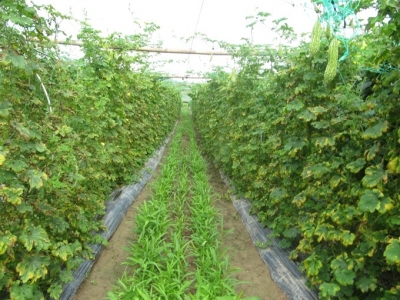High-tech farms for Đà Nẵng

A safe vegetable farm in Đà Nẵng. — VNS Photo Công Thành
ĐÀ NẴNG — The central city of Đà Nẵng plans seven suburban communes in Hòa Vang District for high-tech farms on a total area of 540ha – a crucial step to boost high quality and safe agriculture.
The director the city’s agriculture and rural development, Nguyễn Phú Ban, said the plan is part of a strategy to develop Đà Nẵng as a safe tourism destination, as well as a centre of nano-industry and world-class high-tech farms.
Ban said the city has allocated 130ha for safe vegetable farming and 310ha for aquaculture and livestock. “The city has recognised 12 farms with certifications of safety and quality, as well as brand names in La Hường and Túy Loan villages. These farms’ products are eligible for sale at major supermarkets in the city,” Ban said.
The city has a total of 50 farms but these provide only 10 per cent of demand for vegetables and farm produce. “We are unable to bring our products to supermarkets in the city because most farmers in the communes have yet to achieve the supermarkets’ required standards of packaging and quality,” said the head of Hòa Tiến Commune’s mushroom farm, Nguyễn Thị Mai Hoàng.
“Our farm has small productivity and limited investment. Our products are only supplied to local residents at rural markets and through vendors,” she said.
A representative of Co-op Mart said the supermarket has strict conditions for local farm produce regarding safety, hygiene, quality and registered labels.
According to the city, all supermarkets welcome "made-in Đà Nẵng" products, but farmers in the city have yet to supply sufficient quality products, including vegetable, seafood and quarantined poultry. The city is supporting local farms in attaining the Việt Nam Agriculture Practice (VietGAP) green label certificate.
According to the city, the introduction of high-tech farm centres could supply enough safe food for the city and tourists. Currently, major vegetables, roots and poultry are provided by businesses from the Central Highlands provinces of Lâm Đồng, Gia Lai, Quảng Nam and northern provinces.
According to a report by the industry and trade department, the city of 950,000 consumes need145,000 tonnes of seafood and 140,000 tonnes of vegetables per year.
At a meeting earlier this year, vice chairman of the city, Đặng Việt Dũng, said only clear information and products with a recognised certificate of origin (CO) are on sale at wholesale markets and shopping centres in 2017.
Related news
 Central Highlands establishes itself as agricultural hub of Vietnam
Central Highlands establishes itself as agricultural hub of Vietnam The Central Highlands has become a major agricultural production hub of Vietnam, producing many high-demand products and bringing home multi-billion USD
 Vietnam's export value of coffee remains low
Vietnam's export value of coffee remains low Vietnam is the second largest coffee bean exporter in the world with 1.78 million tons exported in 2016, worth $3.34 billion.
 Help sought for pig farmers
Help sought for pig farmers The Ministry of Agriculture and Rural Development (MARD) has asked the Prime Minister for assistance for pig farmers who have suffered hefty losses sparked